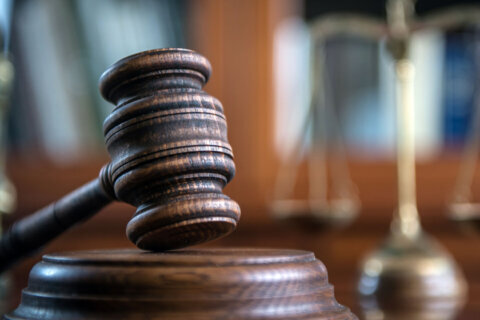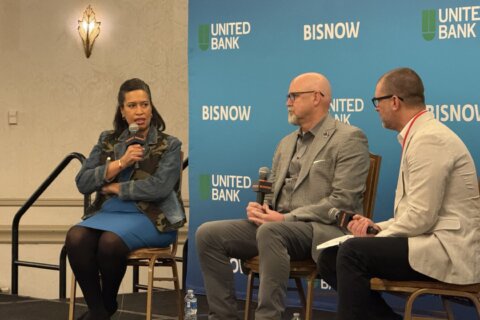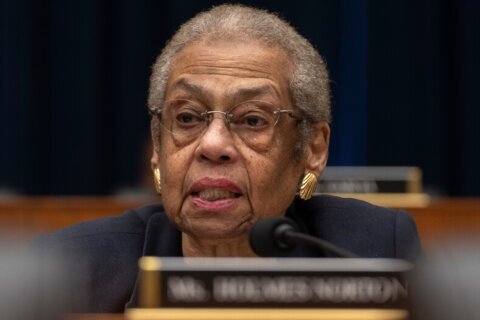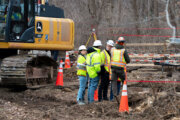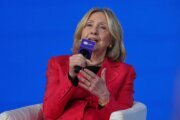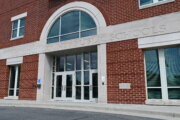EDITOR’S NOTE: Last week, D.C. Mayor Muriel Bowser spoke as part of the Democratic National Convention about President Donald Trump’s use of federal troops and tear gas against peaceful protesters in the District this summer. She stood looking out over Black Lives Matter Plaza in D.C. and introduced the family of George Floyd, whose death at the hands of the Minneapolis police in May began a summer of protests nationwide.
Her remarks were sharply criticized at the time by April Goggans, an organizer with the D.C. chapter of Black Lives Matter. Goggans considered Bowser’s words hypocritical, arguing that real change requires defunding the police — a slogan that was applied to the street near the plaza — and that Bowser has moved in the opposite direction.
Those words were part of a longer conversation with WTOP’s Nick Iannelli. Below is the full transcript of their conversation, with minimal editing.
— Rick Massimo
Nick Iannelli: We’re in the middle of the Democratic National Convention. And this is a significant day because Mayor Muriel Bowser just spoke in front of the convention and in front of the nation, and your group is very critical of her and some of the things she had to say. So what is your main issue today following her speech?
April Goggans: I think it’s very clear that number one, she has either really believed in what she’s saying about D.C. and setting a pace for Black lives mattering, or she really is crafting a narrative around D.C., leaning on the fact that this is the seat of government for the United States, and needing to make a visible connection between Black Lives Matter and herself.
But the truth is that … especially when it comes to policing and protesting, Muriel Bowser has proven over and over again that she supports, she knows about, and sanctions the violent way that police crack down on protesters.
Has your group had a chance to sit down with either the mayor, or the police leadership, or the mayor’s administration or anything like that, to voice your concerns and hear what they have to say about it?
They’ve voiced how they feel all the time on TV, in press conferences and the media — as do we. We don’t trust [that] what they would say [would be] anything different than what they would do. And I think that it’s important to understand that because they are public people, that what they say and do should be in the public.
So to us, they know exactly what we want [and] why — there’s press releases, there’s events. You know, we’ve said for years exactly the way that we feel and what we demand. So there’s actually nothing more to talk about. They have just drawn a line in the sand that they’re not interested in making the real shifts in both thinking and acting in ways that are no longer harmful to Black people.
So you have not requested a meeting with the police leadership or the mayor or anything like that?
Absolutely not.
Do you think that that might be helpful, if you were to get in a room with them? Or — you said that that wouldn’t go anywhere, then, if you were to speak with them face-to-face?
Absolutely not, especially since both of them are highly surveilling me — I, not only as an individual, wouldn’t feel safe. But also again, I think that they are politicians — [and] that does include Peter Newsham — and I believe that anything that they say is not just about me, or just about Black Lives Matter. That they owe change, and they owe an end to the lip service to all Black people in D.C.
So how do you feel about the overall Black Lives movement in the D.C. area over the last few months? Do you think your goals are being met, and do you think you’re voicing your concerns are being heard?
Absolutely. I think, again, people are clear about what it is we’re talking about. I think, also, people are starting to maybe understand that we as an organization in D.C. [are] much different than … the Black Lives Matter movement overall, and that we’re only one part of that.
And I feel like people should probably know that we don’t expect the government, the state, the mayor, the police department, to end all of the ills of society, right? Like, this is actually highlighting the fact that we live in a failed state — that they actually can’t do for us what is needed for us all to have real safety and to be able to thrive.
The Black Lives Matter DC movement added that “Defund the Police” part to the Black Lives Matter Plaza that’s written on the street over there. What does that mean to you, “defund the police”? And do you think that that sort of message — which could be taken as a radical message — do you think that that hurts your overall cause?
The police need to be defunded. I think, number one, people are just scared to ask, “If we don’t have the police, then what?” instead of looking at the overall. First, most people don’t read the budget to know what’s in the budget. Also, as Black Lives Matter DC, we are abolitionists — we do believe in the eventual abolition of police and prisons.
We believe that they don’t do the things, and can’t do the things, that people actually want them to do — that when we’re talking about safety, both the data and the numbers just don’t support them being the answer to safety in our society. They never have; they weren’t created that way, and they just literally can’t, regardless of how you feel about policing.
This is actually highlighting the fact that we live in a failed state — that they actually can’t do for us what is needed for us all to have real safety and to be able to thrive.
— April Goggans
Also, I mean, during this all of these protests, Mayor Bowser was gutting the budget of violence interruption, violence prevention, and adding money to the police budget. So this is another reason why we wouldn’t sit down with them: the fact that … despite what they say in the news, if Black Lives Matter, they wouldn’t keep funding the agency and the practices that actively harm Black people.
And so whether or not the council actually does that — which they did not do; they did not defund the police, I think people need to understand that, and actually they got a raise — [it’s] more about the conversation about where we invest. In our communities, in ourselves, in ways that actually allow people to thrive and aren’t controlled by the whims or whatever protest is going on, that really are long lasting, generational changes to the basic standard and quality of life.
So when you say “defund the police,” you’re actually saying “abolish the police.” Is that right?
Yeah, we are. Yeah.
If there was no police, law enforcement activity, in big cities like D.C. or, you know, Baltimore and Chicago, places that are seeing rising gun violence right now — if there was no police presence anywhere around there, how do you think that violent crime would be deterred? I mean, it’s how our society has always functioned — the police respond. And there are sometimes bad actors within police departments. But overall, the police are meant to prevent some of these violent incidents. So, if there was no police presence, how do you think that our cities would deal with things like that?
You said two very important words that make all the difference. … They respond. Police don’t deter crime; they cannot police people’s minds. There’s not a way for them to actually stop crime before it happens.
We know that the numbers in all cities [and] states show that even increased policing — especially when it comes to homicides, and actually these were Mayor Bowser’s words on a TV interview — that they don’t actually stop homicides. And if you look at the recent homicides we’ve had here in D.C., and count the number of times that the police were actually on the scene and couldn’t and didn’t stop them, or the number of people who have been killed in front of police departments, or on the same block, I think what we are afraid of is saying “What do we do?” But we’re not looking at “Is it working right now? Is it doing the thing that you think it can do? And fundamentally, can it ever be changed to do that?”
Because most of the things that people said that they want the police do, you do not have to be a police officer to do. And so, if it’s about safety, if it’s about watching over things, those are things that you don’t need a gun to do. And how do we know this? Because in other countries, they don’t. And so for us, yeah — they are responding to things. They cannot prevent, and do not prevent, crime.
Police don’t deter crime; they cannot police people’s minds. There’s not a way for them to actually stop crime before it happens.
— April Goggans
I mean, Peter Newsham testified under oath two years in a row — [the council] asked him, “What does increased policing do?” His answer was always, “It makes people feel safe.” Council members pushed back and asked, “What is the difference between feeling safe and being safe? Does it make people safer?”
He said, “No; it makes people feel safe.” So if people are committed to actually wanting real safety, that comes from more than just policing, then people have to be real about that.
People always ask, “What about the rapists and murderers?” And you have to ask yourself, “What about them now?” Ninety-eight percent of the people who are rapists are not in jail. And they’re not going to go to jail. So is it really stopping anything? And people who commit harm are everywhere — we don’t know. … And the police, the prisons — there’s no incentive for people to take accountability, real accountability, because at every moment, you are told not to talk to the police, that even when you’re arrested, you remain silent when you go — because what we know is, it doesn’t work.
And so no matter what the crime was, or not, the “punishment” will not fit most likely will not fit the crime. [And] being innocent is not a guarantee of getting out or being set free. So people have to ask, “Is it really doing what we want it to do? Is it working now?” And if the answer is no, then not having them is going to do what?
We’ve been told that we can’t control ourselves. And the truth is, before we decided we were going to let militias become police, people took care of themselves. We know what’s right and wrong, because communities can make norms and decisions about how they will be in relationship with each other. They can set rules; they can set ways of being with each other and develop their own systems of accountability that actually are about doing the hard work, of understanding why people do the things that they do, what can prevent them from doing it again, and to repair the harm that they’ve caused — while also being in charge of making sure other people don’t do the same thing they did.

I want to ask you about some of the actions of people involved in Black Lives Matter DC protests recently — in recent months and even in recent days. I know the D.C. police made a number of arrests last week, I believe it was, and the D.C. police put out a statement saying that they made arrests because there were some fires started and some property damaged. When someone involved in one of your protests damages property or breaks into a business or starts a fire like that, does that interfere with your overall message and your goals?
So, I think we should also be clear that our chapter hasn’t had protests. What you’re seeing are new groups and individuals who are calling for protests. We had a caravan; we’re getting ready to do a vigil. But as far as protests, these are people who are doing their own. I also think it’s a distraction to worry about property. I feel like the media, even the police, talk more about property than they do about people.
Are you against the property damage?
Really, actually, I just don’t care. Because I have a limited amount of energy … to spend on the things that I’m principled about. And so, that doesn’t include spending time wondering and caring about how other people, especially other oppressed people, how they decide to protest against the oppressors. Yeah, I think that is a distraction … just like comparing a Black Lives Matter to not caring about community violence. All of these things are just made to be sensational.
Protest is protest, and I feel like it’s not about how, it’s about why we’re protesting. And so the fact that they put out statements about that, instead of how upset they were about the things that their officers are doing, again — after Pershing Park; after J20 and the inauguration; that they’re still kettling people; Swann Street — says to me that it’s a distraction for them too.
It’s the same thing they do when they kill someone — the first thing that comes to mind is them talking about how they stole a piece of gum when they were 5 years old, not the fact that they were that they were killed by police. So I think it’s a double standard, that we talk about violence only as it relates to people who are paid not to be violent.
People always ask, “What about the rapists and murderers?” And you have to ask yourself, “What about them now?”
— April Goggans
And to be honest … it’s why we don’t use the binary of “peaceful” versus “violent” protests — because it’s the police that bring the guns and the riot gear. They are ready to attack; they’re prepared to quell dissent. That’s not how we come to protest. So, yeah, I think focusing on all of that is a distraction, and it’s a long-held tactic to get us off of talking about what’s actually happening.
[That] all of this was happening the same time that videos of people that MPD has killed were coming out, that Mayor Bowser is introducing George Floyd’s family, is disgusting. And that’s where we should be talking. And she did it on purpose overlooking Black Lives Matter Plaza. All of these things are made to actually distract, [to] make other people who don’t earn the right of talking about Black Lives Matter look like they’re leading it. And by that I mean Muriel Bowser.
You said earlier that the main goal of your movement is to get public support, get your message across and get your voice heard and make change in society. But when you say you don’t care about other people having their property damaged, I think that might shut down the minds of anyone who might be open to listening to your message or be open to hearing you, you know? Don’t you think that might close their minds when they hear that you don’t care if someone gets hurt or property is damaged?
We’re not in the streets just because we want followers to feel comfortable with our message. We’re actually in the street because we want the state to stop killing Black people. So … the goal of the movement isn’t just to have more people march; we literally are marching for the lives of Black people. So if folks are uncomfortable with that, they’ve been uncomfortable with talking about how they’re complicit in racism and white supremacy, too.
So, I mean, everybody is a critic when it comes to however we do anything. But the goal of the movement is to stop Black lives from being murdered. It’s not for building a team of new marchers. It’s not for building a new set of people who can take selfies on Black Lives Matter Plaza. It is about demanding that dignity and the very life of Black people here and around the world.
You just mentioned critics of your movement. We often hear critics say that you speak out against police violence against people of color, but we don’t often hear your group talk about gun violence in Black communities in D.C., Baltimore and Chicago. And there’s a criticism that maybe you should be talking more about that as well. What is your response when you hear that criticism?
My response is that that’s a lazy assumption. If you look us up, right now, we work with families every single week of people that are killed in D.C., but we don’t do it for the cameras. I think it’s also a lazy assumption to assume that Black Lives Matter is supposed to be the group for everything, and that people get to tell us how we spend our volunteer time at the same time that our group has lost people in community violence. We are the ones who helped push the NEAR Act from getting written to adopted to funded to now implemented.
So the thing is that people [are] not actually out there themselves, to see us at the vigils, to see us at the murder sites, or to [see us] get the therapy that we need after being at six murder sites in in a two-week period. So I think it’s lazy; I think that people just always want something to complain about. Because what they forget is, we’re Black; we live in these communities. I’ve had five homicides within a two-block radius over the last year. So there’s no way that we can’t be worried about it, that we can’t speak out about it. We all have children. And again, most of us have been touched by or are victims of violence, because we’re Black and we live in DC.
So, you know, I would encourage people to actually look instead of assuming. Because chances are we’re doing more work around Black lives, period, than they are because we don’t have time to criticize things that we could Google online.


